AI won’t replace human intuition in shopping. But it will outsmart you in making better business decisions. While people trust their gut, AI shopping assistants rely on real-time data, trends, and patterns to deliver precise recommendations.
The impact of AI shopping assistants extends beyond basic customer service - businesses implementing these solutions report a 35% increase in conversion rates and a 25% rise in average order value (McKinsey, 2023). Moreover, AI shopping assistants are becoming increasingly sophisticated, with 82% of businesses planning to invest in AI-powered retail solutions by 2025 (Accenture, 2024).
This shift may seem strange, but it’s happening now, and businesses that ignore it risk falling behind. Imagine streamlining customer service, automating personalized offers, and predicting trends – all in real-time. An AI shopping assistant can make this possible, transforming how companies interact with customers and optimize operations. It’s not just tech for the future. It’s a necessity today.
What is an AI shopping assistant?

An AI shopping assistant is a digital tool powered by artificial intelligence that helps customers navigate the buying process online. These assistants use algorithms, machine learning, and natural language processing to provide personalized recommendations, answer customer questions, and guide them through their shopping journey. From suggesting products to providing detailed information, they act like a personal shopping assistant, but in a virtual space.
Unlike traditional customer service models, an AI personal shopper works 24/7 and can handle a wide range of queries without human intervention. Whether it’s recommending products based on past purchases or helping a customer find the right size, these virtual shopping assistants make shopping more convenient, personalized, and efficient.
How AI shopping assistants work
An AI shopping assistant functions by processing vast amounts of data from customer interactions and purchase histories. It uses this data to predict what a customer might want, offer recommendations, and assist in decision-making. The assistant constantly learns from user behavior, improving its accuracy and responsiveness over time. These systems can be integrated into websites, apps, or even social media platforms, creating a seamless shopping experience.
Types of AI shopping assistants
There are various types of AI assistants for ecommerce, each offering unique benefits to both businesses and consumers. Let’s explore some of the most common types of AI personal shoppers and how they work.
Chatbots

Chatbots are one of the most widespread forms of AI shopping assistants. These online shopping assistants engage with customers in real-time, answering queries, guiding them through the buying process, and even handling simple customer service tasks. They can be found on ecommerce websites and apps, providing instant support without the need for human intervention. A virtual shopping assistant in chatbot form can learn from customer interactions, becoming smarter and more helpful over time.
Virtual try-on tools

One exciting development in AI shopping assistants is the rise of virtual try-on tools. These allow customers to see how a product, like clothing or makeup, will look on them without physically trying it on. Using augmented reality (AR) and AI, these virtual shopping assistants create a realistic preview for the customer. This helps reduce returns and increases customer confidence in their purchases. It's a valuable tool, especially in fashion and beauty ecommerce.
Personalized product recommendations
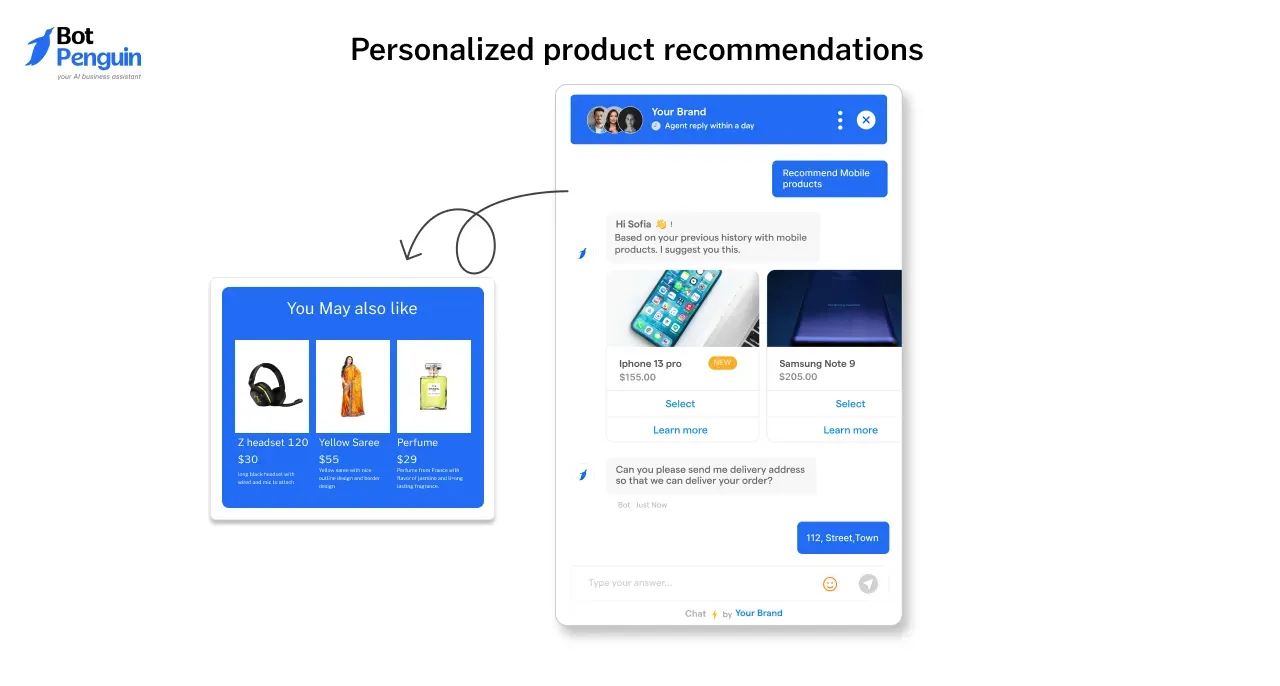
Another crucial feature of an AI shopping assistant is its ability to provide personalized product recommendations. By analyzing a customer’s browsing history, preferences, and past purchases, these personal shopping assistants can suggest products that a shopper is likely to buy. This feature not only improves customer satisfaction but also drives sales by showing users items they’re interested in, without them needing to search manually.
Predictive analytics
Predictive analytics is a powerful tool used by AI shopping assistants to anticipate future trends and consumer behaviors. This is particularly valuable for businesses, as it helps them stock the right products, offer timely promotions, and plan for future demand. By analyzing historical data, an online shopping assistant equipped with predictive analytics can recommend products or discounts that align with emerging trends.
Benefits of AI Shopping Assistants for Businesses
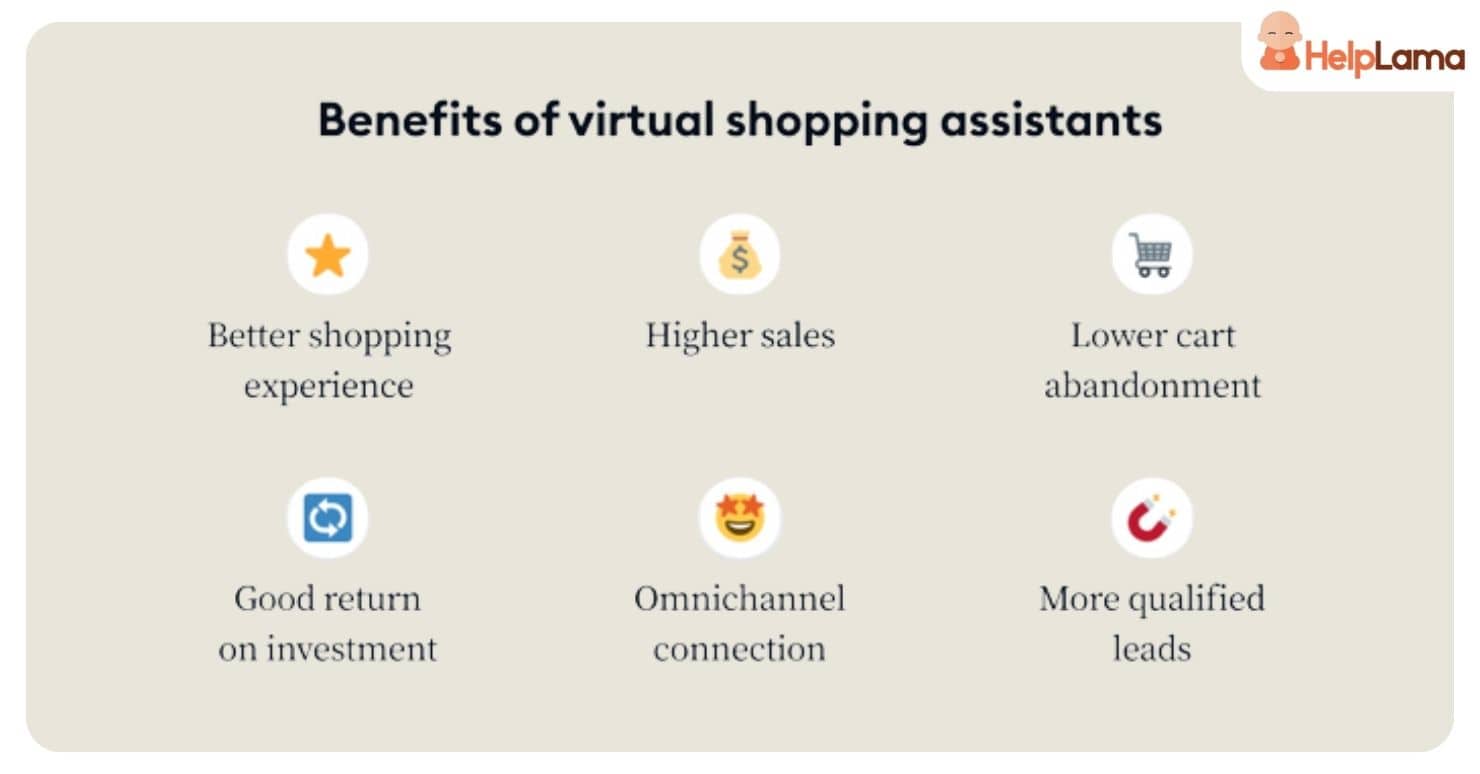
In this section, we’ll explore the specific ways an AI shopping assistant benefits businesses, from improving customer engagement to delivering data-driven insights that shape future strategies.
Improved Customer Experience
An AI shopping assistant plays a critical role in enhancing the overall customer experience. By using real-time data and machine learning, these assistants interact with customers in ways that make shopping more convenient and personalized.
Enhanced customer engagement
One of the biggest advantages of using AI assistants for ecommerce is the ability to engage with customers in a more dynamic and meaningful way. These online shopping assistants can offer personalized greetings, guide users through product options, and recommend items based on their behavior. This level of interaction helps businesses build stronger connections with customers, keeping them engaged throughout their shopping journey.
Personalized recommendations
An AI personal shopper analyzes a customer’s preferences, purchase history, and browsing patterns to provide tailored product suggestions. These personal shopping assistants can predict what a customer is likely to want next, offering highly targeted recommendations that improve the shopping experience. Personalized suggestions not only increase customer satisfaction but also encourage repeat purchases.
Suggested Reading:
Faster response times
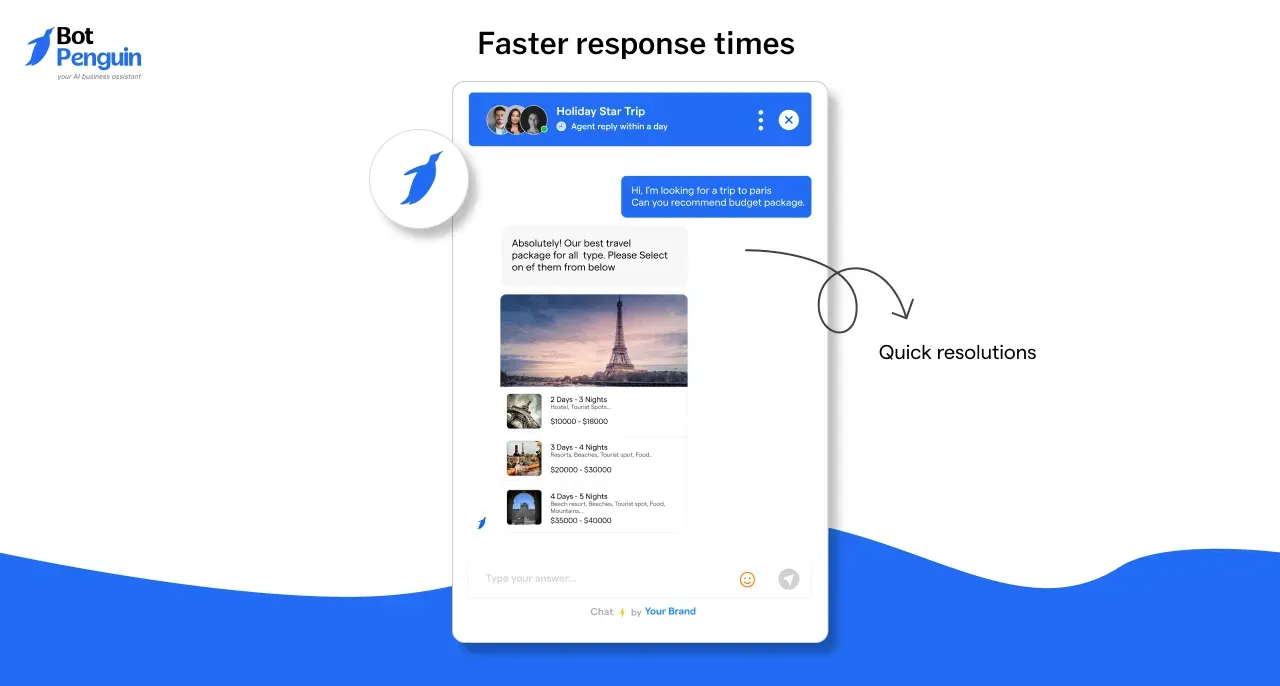
With online shopping assistants, customers no longer have to wait for human help. Virtual shopping assistants, particularly chatbots, respond to queries instantly, providing quick resolutions to problems or questions. Whether it’s product inquiries or help with completing a purchase, faster response times significantly improve customer satisfaction, reducing frustration and cart abandonment.
Increased Sales and Revenue
Using an AI shopping assistant can directly impact a business’s bottom line by driving more sales and increasing revenue.
Upselling and cross-selling opportunities
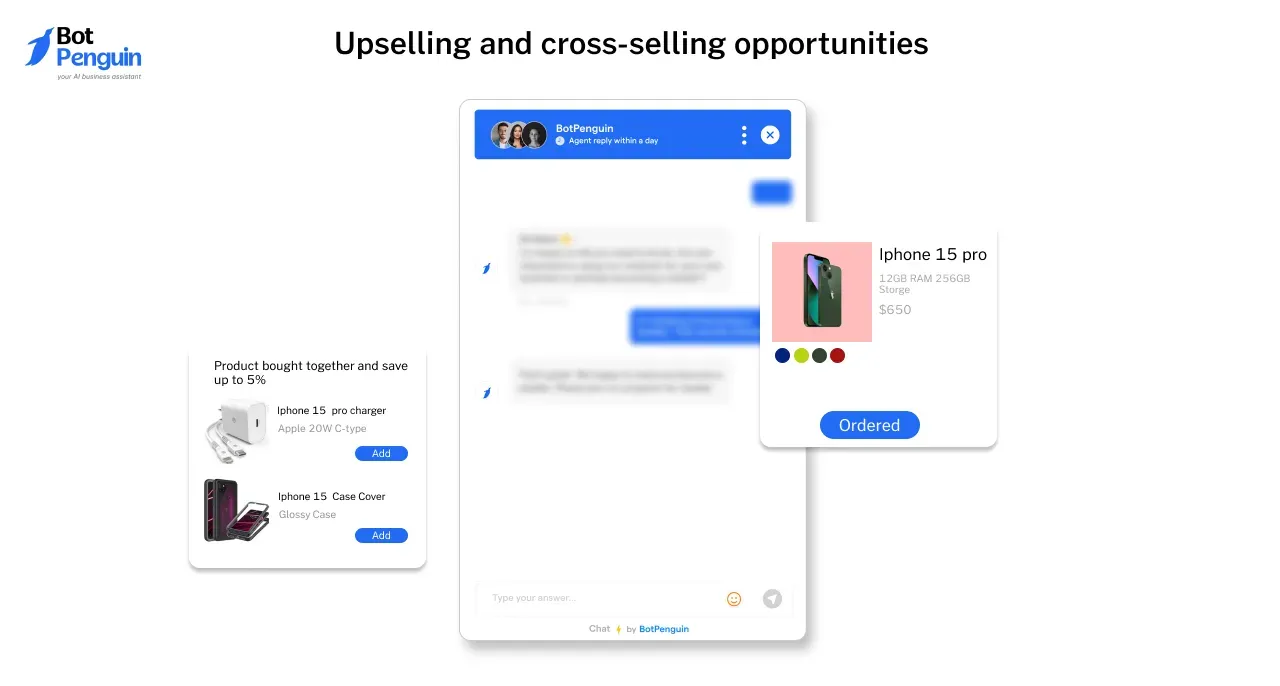
An AI personal shopper can identify upselling and cross-selling opportunities that may be missed by human staff. By analyzing customer preferences and purchase patterns, these virtual shopping assistants can suggest complementary products or higher-end options during the buying process, encouraging customers to spend more.
Reduced cart abandonment
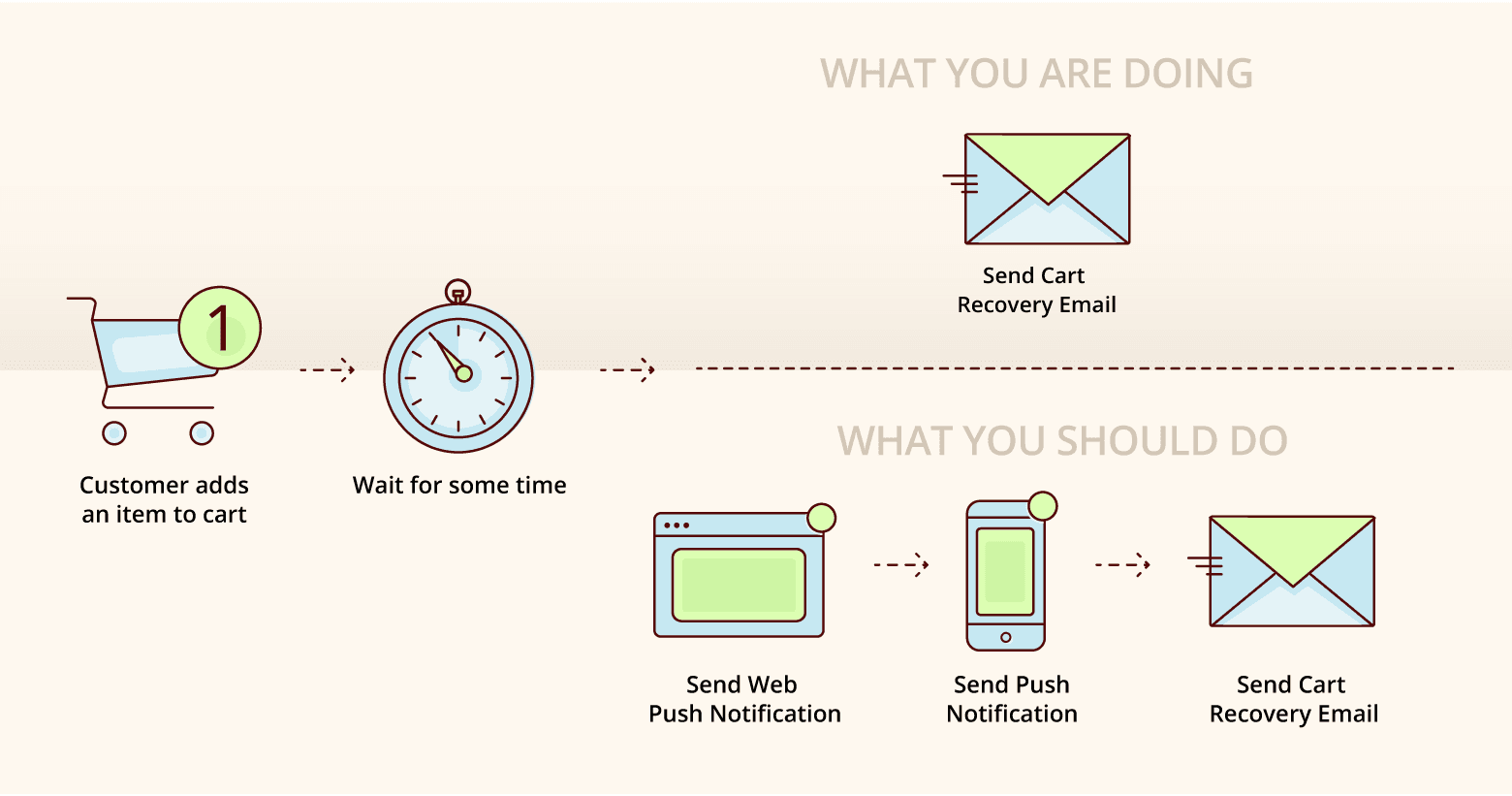
Cart abandonment is a common issue in ecommerce, but an AI shopping assistant can help reduce this problem. By engaging customers with reminders, offering additional product details, or providing last-minute discounts, these online shopping assistants help guide customers toward completing their purchases, reducing the likelihood of abandoned carts.
Optimized product placement
AI can also improve product placement by analyzing user behavior to determine where specific items should appear on a webpage. Optimized product placement ensures that the most relevant items are shown to users, increasing the chances of purchase. By fine-tuning the customer’s browsing experience, businesses can maximize the visibility of key products.
Operational Efficiency
Aside from improving the customer-facing side of a business, AI assistants for ecommerce can also streamline operations, saving time and resources.
Streamlined customer service
With an AI shopping assistant handling many routine customer service queries, businesses can reduce the strain on human staff. This leads to more efficient workflows, allowing customer service teams to focus on more complex issues. The use of virtual shopping assistants ensures that customers receive consistent, high-quality service without requiring as much human involvement.
Automated tasks
Automation is one of the key benefits of AI. From answering customer queries to processing orders, online shopping assistants can automate many repetitive tasks. This not only speeds up operations but also reduces the chance of errors, creating a smoother experience for both the business and the customer.
Inventory management
An AI shopping assistant can track and analyze sales data to help businesses manage their inventory more efficiently. By predicting future demand and identifying popular products, AI helps retailers ensure they have the right stock levels at all times. This reduces the risk of overstocking or stockouts, leading to better resource management and cost savings.
Data-Driven Insights
Finally, one of the most significant benefits of an AI shopping assistant is its ability to gather and analyze data, providing valuable insights that drive better business decisions.
Customer behavior analysis
Through constant interaction with customers, an AI personal shopper gathers data on preferences, purchase patterns, and browsing habits. This data can be analyzed to better understand customer behavior, helping businesses tailor their marketing strategies and product offerings to meet customer needs more effectively.
Market trends identification
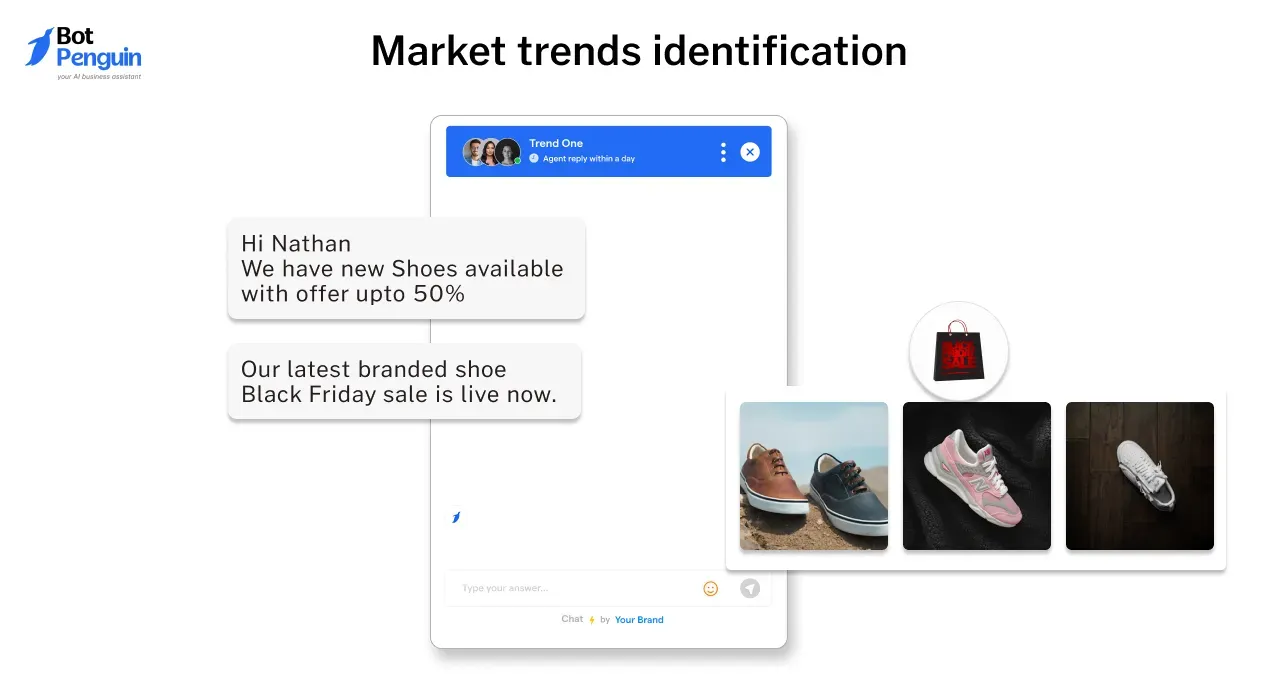
An AI shopping assistant can also identify broader market trends by analyzing data across a wide range of interactions. This allows businesses to stay ahead of trends and adjust their product lines, pricing, and promotions accordingly. In today’s fast-paced retail environment, staying ahead of market changes is critical for maintaining competitiveness.
Case Studies: Successful Implementations of AI Shopping Assistants
In this section, we’ll explore how companies like Sephora, Walmart, and Macy’s used AI shopping assistants to overcome challenges and achieve measurable success.
Sephora

Sephora is a global beauty retailer known for its wide range of cosmetics, skincare, and personalized beauty services.
- Problem they faced: Sephora struggled with providing personalized recommendations to a vast and diverse customer base. Customers often found it difficult to choose the right products for their unique skin tones and preferences, leading to indecision and lost sales.
- AI solution implemented: Sephora introduced a virtual shopping assistant called "Color IQ" and AI personal shopper tools to offer personalized product recommendations. These tools used machine learning to analyze customer preferences, skin tone, and beauty needs, making tailored product suggestions.
- Results achieved: The AI shopping assistant improved customer engagement by offering personalized recommendations, which boosted sales and reduced decision fatigue. Sephora saw an increase in customer satisfaction and a rise in repeat purchases due to the enhanced shopping experience.
Walmart

Walmart is a multinational retail corporation offering a vast array of products, known for its large inventory and competitive prices.
- Problem they faced: Walmart faced challenges with inventory management and ensuring customers could easily find relevant products from their vast inventory. Customers often experienced frustration searching through the large product selection.
- AI solution implemented: Walmart deployed AI assistants for ecommerce to streamline product searches and improve inventory management. The online shopping assistant helped customers find products faster by analyzing their shopping behavior and preferences, while predictive analytics optimized stock levels.
- Results achieved: By implementing AI shopping assistants, Walmart reduced product search times and improved customer satisfaction. Additionally, the AI-driven inventory system led to better stock management, reducing the number of out-of-stock items and optimizing restocking processes.
Macy’s
Macy’s is a well-known department store chain, offering clothing, home goods, and accessories, with a strong online presence.
- Problem they faced: Macy’s struggled to engage customers effectively online and reduce cart abandonment. Many customers left the site before completing their purchases, resulting in lost revenue.
- AI solution implemented: Macy’s introduced a virtual shopping assistant that could guide customers through their shopping journey, offering personalized product suggestions and answering real-time queries. The online shopping assistant also provided reminders and incentives to complete purchases.
- Results achieved: The implementation of the AI shopping assistant significantly reduced cart abandonment rates, increased conversions, and improved overall customer engagement. Macy’s saw an increase in completed sales and a more seamless online shopping experience for customers.
Challenges and Considerations of AI Shopping Assistant
Implementing an AI shopping assistant can greatly benefit businesses, but there are important challenges to consider. While these tools enhance customer experience and streamline operations, issues like data security, technical limitations, and integration difficulties need attention. Here’s a closer look at some of the key challenges.
Data privacy and security
Using AI assistants for ecommerce involves collecting and analyzing large amounts of customer data. Ensuring that this data is secure and complies with privacy regulations is essential to maintaining customer trust.
Technical limitations
While AI shopping assistants are highly advanced, they are not without limitations. Complex queries or uncommon scenarios may still require human intervention, and the technology needs constant updating.
Integration with existing systems
Integrating a virtual shopping assistant with current ecommerce platforms can be challenging. Businesses must ensure that the AI system works smoothly with their existing infrastructure to avoid disruptions.
Cost of implementation
Implementing an AI personal shopper can be costly, particularly for small businesses. From initial setup to maintenance, the investment required is a crucial consideration for companies looking to adopt AI.
Conclusion
In conclusion, AI shopping assistants have emerged as indispensable tools for growth and customer satisfaction. Platforms like BotPenguin are leading this transformation by offering sophisticated AI solutions that combine natural language processing, machine learning, and predictive analytics to create seamless shopping experiences.
BotPenguin's AI shopping assistants stand out by offering customizable features that adapt to unique business needs, from small e-commerce stores to large retail chains. Their solution exemplifies how AI can simultaneously reduce operational costs while enhancing customer experience through personalized recommendations and 24/7 support.
The future of retail clearly belongs to businesses that embrace AI shopping assistants. As these technologies continue to evolve, we can expect even more sophisticated capabilities, deeper personalization, and seamless integration across multiple shopping channels. Companies that implement AI shopping assistants today are not just optimizing their current operations – they're future-proofing their business for tomorrow's retail landscape.
Whether you're looking to boost sales, improve customer satisfaction, or streamline operations, AI shopping assistants like BotPenguin represent a critical investment in your business's future. The question is no longer if businesses should adopt AI shopping assistants, but when and how to implement them most effectively.
Suggested Reading:
Frequently Asked Questions (FAQs)
What is an AI shopping assistant?
An AI shopping assistant is a digital tool powered by artificial intelligence that helps customers by providing personalized recommendations, answering queries, and streamlining the shopping process, often using data analytics and machine learning.
How does an AI shopping assistant improve customer experience?
AI shopping assistants offer real-time support, personalized product suggestions, and instant responses to queries, enhancing customer satisfaction by making the shopping process more efficient and tailored to individual preferences.
What types of AI shopping assistants exist?
Common types include chatbots, virtual try-on tools, personalized recommendation engines, and predictive analytics systems. Each offers unique functionalities that improve customer engagement, streamline processes, and optimize shopping experiences.
How do AI shopping assistants increase sales?
AI shopping assistants boost sales by providing personalized product recommendations, enabling upselling and cross-selling opportunities, reducing cart abandonment, and optimizing product placement based on customer preferences and behavior.
Are AI shopping assistants expensive to implement?
The cost of implementing AI shopping assistants can vary, depending on the scale and complexity. While initial costs may be high, the long-term benefits, such as increased efficiency and higher sales, often justify the investment.
Is customer data secure with AI shopping assistants?
AI shopping assistants collect and analyze customer data, but businesses must ensure compliance with privacy regulations and implement robust security measures to protect customer information and maintain trust.



